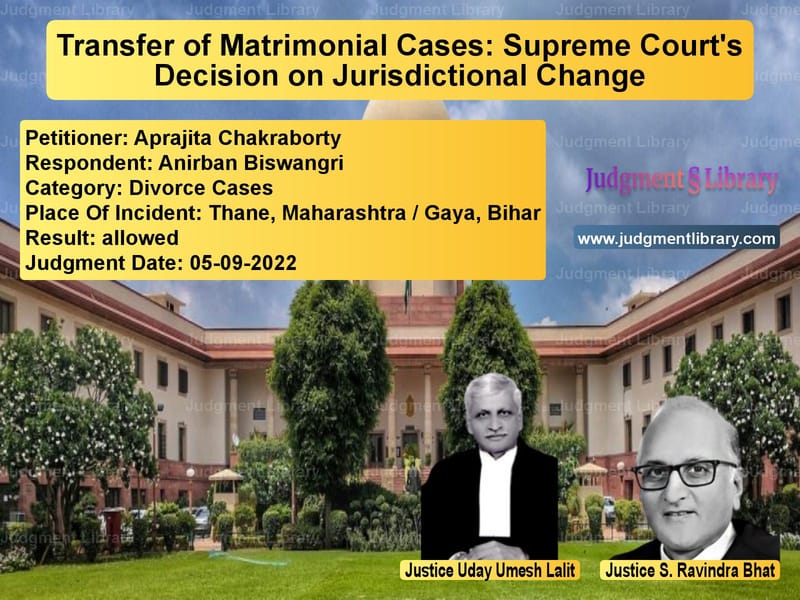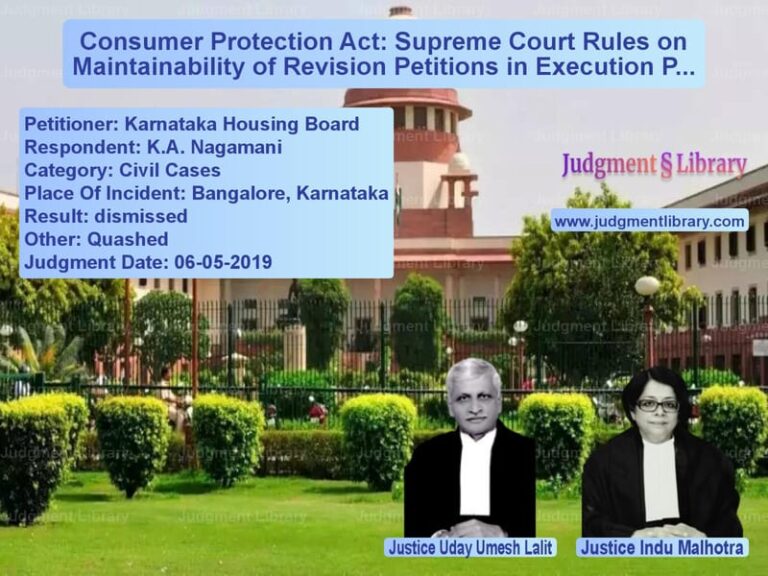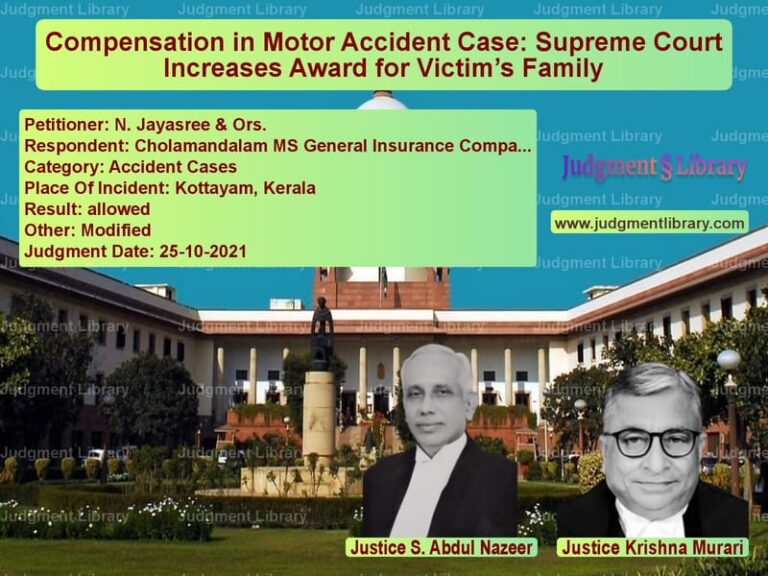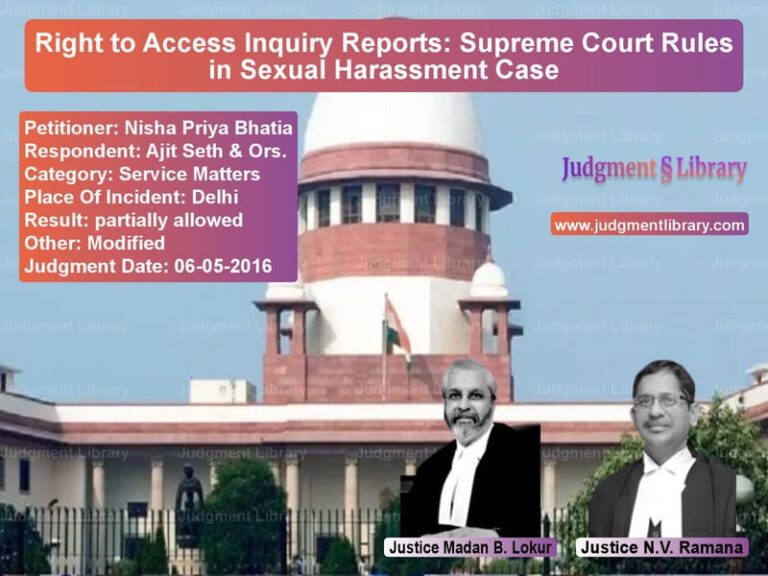Transfer of Matrimonial Cases: Supreme Court’s Decision on Jurisdictional Change
This case involves a transfer petition filed by the petitioner, Aprajita Chakraborty, seeking the transfer of her matrimonial case from the Family Court at Thane, Maharashtra, to the competent court at Gaya, Bihar. The dispute arose after the respondent, Anirban Biswangri, filed a marriage petition in Thane, and the petitioner, residing in Gaya, found it challenging to attend hearings in Maharashtra. The case highlights the role of the Supreme Court in transferring cases for the convenience of the parties involved, particularly in matrimonial disputes.
The petitioner, Aprajita Chakraborty, filed the transfer petition on the grounds that she was residing in Gaya, Bihar, and that traveling to Thane, Maharashtra, for hearings was causing undue hardship. The respondent, Anirban Biswangri, opposed the transfer, arguing that the case should remain in the jurisdiction where it was filed. However, the Supreme Court, after considering the facts and circumstances, allowed the transfer of the case to Gaya, Bihar, and emphasized the importance of resolving matrimonial disputes in a convenient and fair manner.
Background of the Dispute
The matrimonial dispute between Aprajita Chakraborty and Anirban Biswangri escalated when the respondent filed a marriage petition in the Family Court at Thane, Maharashtra, in 2021. The petitioner, however, resides in Gaya, Bihar, and the travel to Thane for each hearing posed logistical challenges and emotional distress. As a result, the petitioner sought the transfer of the case to a competent court in Gaya, where she resided and where the issues surrounding their marriage could be resolved.
The transfer petition was filed under Section 25 of the Civil Procedure Code (CPC), which allows the transfer of cases for the convenience of the parties involved. The petitioner argued that the transfer was necessary for her to effectively participate in the proceedings and ensure a fair trial. The respondent, Anirban Biswangri, objected to the transfer, asserting that the case should remain in the jurisdiction of the Family Court at Thane, Maharashtra, as it was originally filed there.
Petitioner’s Arguments
The petitioner, Aprajita Chakraborty, argued that the transfer of the case was necessary to avoid undue hardship. She emphasized that she had been residing in Gaya for an extended period and that attending court hearings in Thane was causing significant emotional and physical distress. The petitioner’s counsel submitted that the transfer would not only ensure her convenience but also allow the case to be heard in a location closer to her place of residence.
The petitioner’s counsel further argued that the respondent had no valid reason to oppose the transfer and that the convenience of the parties should take precedence. The counsel pointed out that the matrimonial dispute could be resolved justly in Gaya, without causing unnecessary delays or hardships. The petitioner also requested that the court consider the practical realities of her situation and transfer the case to Gaya, which was in the best interest of both parties.
Respondent’s Arguments
The respondent, Anirban Biswangri, opposed the transfer petition, arguing that the case should remain in Thane, Maharashtra, where it was initially filed. The respondent’s counsel contended that there was no sufficient reason for the case to be transferred, as the petitioner could have appeared in Thane for hearings and resolved the matter there. The respondent further argued that the petitioner’s request for transfer was an attempt to delay the proceedings.
The respondent’s counsel emphasized that the Family Court in Thane had already begun processing the case, and transferring it to Gaya would unnecessarily prolong the proceedings. The respondent also argued that the convenience of the petitioner should not outweigh the interest of the respondent, who had filed the case in Thane and had an expectation that it would be heard there.
Court’s Reasoning
The Supreme Court carefully examined the arguments from both parties and considered the practical implications of the case. The Court recognized the importance of ensuring that both parties had access to a fair trial and that logistical challenges should not hinder the legal process. The Court referred to previous cases where transfer petitions had been allowed for the convenience of the parties, particularly in matrimonial disputes where emotional and physical distress could affect the parties’ ability to participate in the proceedings.
The Court acknowledged that the petitioner’s residence in Gaya, Bihar, made it difficult for her to attend hearings in Thane, Maharashtra. The Court also recognized that the transfer of the case to Gaya would not cause significant prejudice to the respondent, as he could still pursue his claims in the new jurisdiction. The Court emphasized that the transfer was in line with the principles of justice, fairness, and convenience, and it noted that the family matters should be handled with sensitivity to the circumstances of the parties involved.
The Court further emphasized that matrimonial disputes should be resolved expeditiously and without causing undue hardship to either party. The Court recognized that the petitioner had made a reasonable request for the transfer of the case, and it found that the convenience of the parties was an important factor in determining the appropriate jurisdiction for the case to proceed.
Read also: https://judgmentlibrary.com/supreme-court-upholds-wifes-convenience-in-matrimonial-case-transfers/
Judgment
The Supreme Court allowed the transfer petitions filed by the petitioner, Aprajita Chakraborty. The Court directed that the matrimonial case, “Marriage Petition No.474 of 2021,” be transferred from the Family Court at Thane, Maharashtra, to the Family Court at Gaya, Bihar. The Court ordered that the entire record of the case be transmitted to the transferee court for further proceedings.
The Court also directed the Family Court at Gaya to explore the possibility of settlement between the parties through the process of mediation, highlighting the Court’s preference for alternative dispute resolution mechanisms in matrimonial cases. The Court instructed the Registry to send a copy of the order to both the Family Courts involved for compliance.
Conclusion
The Supreme Court’s ruling in this case reinforces the importance of convenience and fairness in the judicial process, particularly in matrimonial disputes. The decision highlights the Court’s flexibility in transferring cases when it serves the interests of justice and when it ensures that the parties involved can participate fully and effectively in the proceedings. The judgment also underscores the role of mediation in resolving matrimonial disputes, encouraging amicable resolutions wherever possible.
This case sets a precedent for future transfer petitions, particularly in matters where the parties are faced with practical difficulties that hinder their access to justice. The Supreme Court’s decision reflects its commitment to ensuring that legal proceedings are accessible, equitable, and responsive to the needs of the parties involved.
Petitioner Name: Aprajita Chakraborty.Respondent Name: Anirban Biswangri.Judgment By: Justice Uday Umesh Lalit, Justice S. Ravindra Bhat.Place Of Incident: Thane, Maharashtra / Gaya, Bihar.Judgment Date: 05-09-2022.
Don’t miss out on the full details! Download the complete judgment in PDF format below and gain valuable insights instantly!
Download Judgment: aprajita-chakraborty-vs-anirban-biswangri-supreme-court-of-india-judgment-dated-05-09-2022.pdf
Directly Download Judgment: Directly download this Judgment
See all petitions in Mutual Consent Divorce
See all petitions in Alimony and Maintenance
See all petitions in Child Custody
See all petitions in Property Division in Divorce Cases
See all petitions in Dowry Cases
See all petitions in Judgment by Uday Umesh Lalit
See all petitions in Judgment by S Ravindra Bhat
See all petitions in allowed
See all petitions in supreme court of India judgments September 2022
See all petitions in 2022 judgments
See all posts in Divorce Cases Category
See all allowed petitions in Divorce Cases Category
See all Dismissed petitions in Divorce Cases Category
See all partially allowed petitions in Divorce Cases Category







